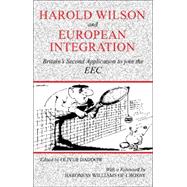Harold Wilson and European Integration: Britain's Second Application to Join the EEC
, by Daddow,Oliver J.- ISBN: 9780714652221 | 0714652229
- Cover: Hardcover
- Copyright: 9/30/2002
Harold Wilson's direction of the second British application to join the EEC is ripe for reinterpretation. During the period of Wilson's first Labour administrations, October 1964-April 1966 and April 1966-June 1970, executive policy-making in Britain became legendary for its supposed opaqueness and intrigue. They are remebered not least for the volume of scandal and in-fighting among a talented but reckless group of ministers, numbering among them a "Machiavellian" Prime Minister in Wilson, a "drunken neurotic" in George Brown, and the highly influential and vocal diarists Tony Benn, Barbara Castle and Richard Crossman. On top of all this, the 1960s saw a plethora of domestic and foreign-policy crises. There remains a fundmental question to be answered: why did Wilson, faced with massive political problems following the April 1966 election, apply to join the EEC while de Gaulle remained dominant in Paris and there was no sign that his position on British "readiness" to enter Europe had changed? This hasvexed historians of the Wilson years. Some have attempted to explain the bid in terms of the premier's Machiavellian cunning. Others have explained the application in the context of Wilson's obsessions with domestic popularity. Yet more put the bid down to a desperate attempt to stave off potential leadership contests from "Europeans" in the cabinet. With new and revealing material now available in the Public Record Office and abroad, this volume reconsiders Wilson's motivations, contextualizing them in light of evidence on foreign policy-making contained in the offical record.







